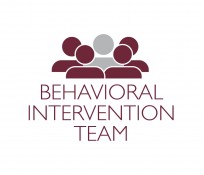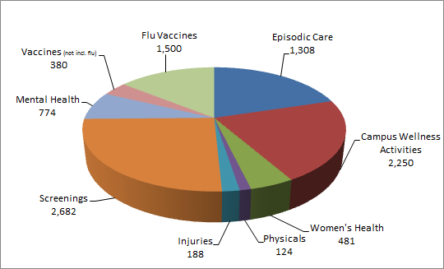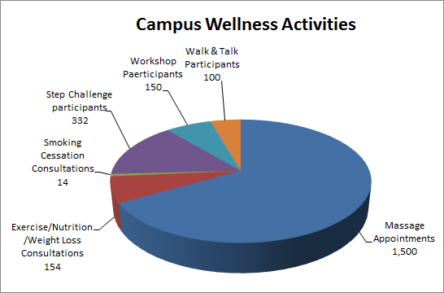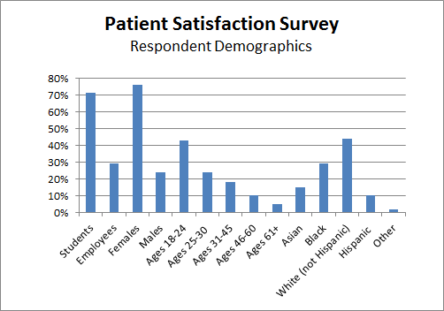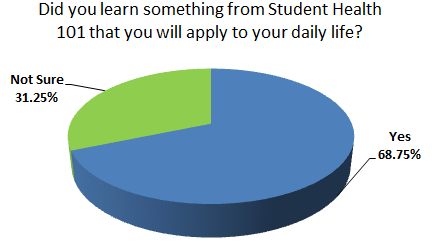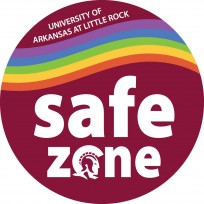Mission
To improve the health and wellness of the university community by providing inclusive, evidence-based, quality health care and wellness promotion.
Summary Narrative
1) Enhance recruitment and retention efforts to increase enrollment
Health Services staffed tables at “Discover Days” for prospective students and at all freshman and transfer orientation sessions for new incoming UA Little Rock students. Information about services available through the clinic were distributed at the events, as were promotional items.
Health Services staff participated in orientation sessions for International Student Services, Study Abroad, and CLC.
2) Strengthen student-friendly operations and customer service
Health Services is a comprehensive medical clinic where students can access a wide array of services to address their health care needs.These services include immunizations; assessment and treatment of illnesses; family planning, including birth control; and screening and treatment for many other health concerns affecting college-aged individuals. Having these services available on-site eliminates the need for students to take time away from classes to seek medical care off campus and allows them to return to classes quickly and continue working toward their degrees.
Health Services launched E-prescribe which allows prescriptions to be electronically submitted to the patient’s pharmacy of choice. E-prescribe saves time as the prescription is normally ready when the patient arrives versus handing the pharmacist a paper prescription and waiting for it to be filled.
Health Services and Campus Wellness assisted the Ask UA Little Rock staff during the busy weeks before classes by directing students to appropriate areas for advising, enrollment, and/or financial aid and helping them log in to BOSS.
3) Improve diversity and inclusion efforts to provide a safe and inclusive environment for students
The Campus Wellness Center established an informal lunch club for international students. Anywhere from 5 to 15 international students from various countries met for lunch each Friday to try different foods and to discuss the similarities and differences among their cultures.The lunch conversations helped to improve the students’ communication skills in English and helped to establish a sense of family and community while living far away from home.
Two staff members completed Safe Zone training. All full-time staff are now “Safe Zoners” and display the Safe Zone sticker in their offices signifying that their space is a safe place to talk about issues impacting the LGBTQ+ community.
The full-time APRN and RN attended a live, on-campus webcast, sponsored by Counseling Services, entitled Lesbian, Gay, Transgender & Questioning Clients: Clinical Issues & Treatment Strategies.
4) Align financial and human resources to operate more effectively and efficiently
For the seventh year, Health Services partnered with the UA System Office and provided biometric screening for UA Little Rock employees. Screening included total cholesterol, HDL, LDL, triglycerides, glucose, BMI, and blood pressure. For employees with UMR health insurance, the screening was billed to UMR and Health Services received reimbursement. 148 employees completed the screening process. Approximately 225 attended the event.
At the request of Janessa Rogerson, First Lady and Ambassador for UA Little Rock, voluntary prostate cancer screening for faculty and staff was conducted on the same day as the biometric screening. 15 men were screened and educated on the warning signs of prostate cancer.
5) Promote student development, engagement, and leadership
Student Health 101, the online magazine filled with information to support students’ health and well-being, was distributed monthly via email to all students.The top 2 most read articles were “The pros and cons of these 7 common contraceptives” and “Smoking Q&A: What do we know about vaping, Juuling, and cigarettes?” YTD page views: 6,207
Students presenting to Health Services were asked about their involvement on campus. Students who indicated they were not involved, were given a card with a unique website that linked to the UA Little Rock Student Experience Center’s involvement opportunities page. Website hits that could be traced back to the card given in Health Services were minimal, however, they did contribute to the total website hits of 284.
Health Services collaborated with the Department of Nursing to provide flu vaccines to the campus community. Nursing students were given a unique opportunity to experience hands-on learning by administering the vaccines. Both nursing faculty and Health Services providers supervised the students. An additional flu clinic was held at the Bowen School of Law.
Total vaccines administered:1,500
Arkansas Act 943 directs colleges and universities to develop and implement action plans to help students prevent unplanned pregnancy or delay plans for pregnancy. In fall 2018, in compliance with this Act, Health Services partnered with Campus Living to place 4 x 6 cards, with the following information, on all desks in all rooms of the residence halls.
Health Services also participated in Trojan Wars, a multi-department function to educate students about safe sex (including STIs, HIV, and unplanned pregnancy prevention).
Health Services partnered with Alpha Phi Alpha to provide students with education on STIs and how to prevent them. HIV testing was conducted in the clinic as part of the fraternity’s event.
A new student wellness committee was formed. The committee consisted of 7 students (Wellness Ambassadors) all of whom played a role in planning, implementing, and evaluating programs and events for the UA Little Rock student population.
Campus Wellness spoke with members of the Chi Omega Sorority on de-stressing and keeping active. 48 students attended.
Campus Wellness partnered with Campus Living and hosted a game of STD BINGO in East Hall for Sexual Health Awareness month. An overview of STIs was presented, then information from the presentation was used to answer questions on the BINGO card. Total attendees: 9
In observance of Red Ribbon Week, Campus Wellness hosted several events throughout the week of October 22. Included was a game of Lightning Trivia which focused on drug abuse; a viewing of the movie “Written Off” which addressed the issue of opioid addiction; and a game of drug BINGO in the residence hall commons area. Approximately 50 students participated.
Health Services and Campus Wellness staff participated in the Self-Care Fair hosted by Counseling Services. Health Services staff took blood pressure readings and helped raise awareness of services available at UA Little Rock. Campus Wellness loaned a massage chair for use at the event. Approximately 60 students utilized the massage chair.
Campus Wellness hosted a table in November for the Great American Smokeout. The table included common household products, such as ammonia, bleach, rat poison, and acetone, which also are found in cigarettes. Materials on the dangers of smoking and how to quit were distributed to approximately 45 individuals.
Campus Wellness and Health Services hosted a New Year’s Resolution Fair in January, which included vendors who helped students set goals to live a healthier and more active life. Representatives from UA Little Rock’s intramural sports and Counseling Services also participated. There were interactive games, blood pressure checks, comfort dogs, prizes, and an opportunity to experience the massage chair loaned by the Campus Wellness Center. Approximately 100 students attended.
6) Other
Health Services staff participated in the “We ❤️ our Students” campaign by writing encouraging messages on the sidewalk in front of the DSC.
In compliance with the Education Department General Administrative Regulations (EDGAR), Part 86, the Drug-Free Schools and Campuses Regulations, the assistant director completed the 2018 biennial report for UA Little Rock and distributed the document Alcohol, Drugs, the Law, and You to all students and employees via an email forwarded through the Office of Communications.
The Student Health 101 Wellness Assessment was sent to all students at the beginning of the 2018 fall semester. The assessment addressed alcohol & drug use, sexual behaviors, smoking, exercise, nutrition, and what concerns the students had about entering college.The assessment results were shared with Campus Wellness to assist in program planning for the year.
#1 Concerns about entering college
- Academic challenges
- Financial issues
- Coping with an existing health condition or disability
- Healthy eating / nutrition
Health Services participated in the Growing Healthy Communities Fair hosted by UA Little Rock’s School of Counseling, Human Performance, and Rehabilitation. Staff provided blood pressure screenings to University District residents and discussed ways to improve their overall health.
Health Services collaborated with IELP and International Student Services to ensure all foreign-born students were screened for tuberculosis per Arkansas state law. A total of 111 students from 42 different countries were screened for TB. No active cases were identified.
The Campus Wellness Coordinator taught 4 “ZOOM” webinars which were broadcast live to all 48 county extension agents in the state of Arkansas. Topics included office fitness, heart disease, back care, and weight loss.
For the second year, the Campus Wellness Coordinator was instrumental in recruiting employees for the Little Rock Marathon – 100 employees participated.
Health Services participated in fall orientation at the William H. Bowen School of Law
Staff from the Office of Admissions at the William H. Bowen School of Law, asked Health Services staff to participate in a video describing services offered through the clinic.The video will be played during future orientation sessions at the law school.
The full-time APRN attended a live webcast, sponsored by Counseling Services, entitledThe New Face of Anxiety: Treating Anxiety Disorders in the Age of Texting, Social Media & 24/7 Internet Access.
All providers completed their annual HIPAA training per state and federal regulations.
At A Glance
Revenue Generated: $138,404. Increase of 17% over the previous year.
Total Clinic Visits: 5,163
During this reporting period, 323 female students were seen in Health Services for contraceptive care visits. 73 of those were for initial birth control prescriptions. Oral birth control pills remained the most requested method; however, 10 students chose the long acting reversible contraceptive implant, Nexplanon. In addition to visits for first time prescriptions, 171 students utilized Health Services for the management of their birth control prescriptions and 79 students were seen for general consultation and advice on choosing a birth control method.
“I love the step challenges. They help me feel like I’m a part of something. They get me motivated to move!”
A patient satisfaction survey was sent monthly to all patients who had visited Health Services during the previous month. Feedback was used to review processes and make adjustments as needed. One area of concern was the size of the font on the self-check-in computers. That issue was corrected. A second concern was the length of the medical history form. Staff have reviewed the form and a shortened version will be in place by fall 2019.
81% of the respondents stated they were very satisfied with their overall experience in Health Services.
Some responses to the question, “during your visit with the provider, what health strategies did you learn that will help with your overall wellness?”
- I received education on sexual health and how to do a breast exam.
- I learned there are numbers for determining high blood pressure. We talked about ways that I can lower my blood pressure and blood sugar.
- Using condoms is very important not only to my health, but everyone’s health that I interact with.
- Drink more water; stay hydrated.
- Exercise more to help reduce stress.
- The best food options to help fight high cholesterol.
General Comments:
“Health Services is by far one of the best departments on campus. They handle individuals with minor things, like colds, just as delicately as they do patients who discover life-changing moments and issues.”
“The provider took time to answer all of my questions and really helped me improve my health. I deeply appreciate it!”
“New employee, wonderful experience. I will be back!!!”
“I was very impressed with how fast and easy the process was.”
Student Health 101, the online magazine filled with information to support students’ health and well-being, was distributed monthly via email to all students and employees. YTD page views: 6,207
Comments from Student Health 101:
- As an autistic person I struggle with social anxiety and introversion. I will definitely use some of these tips to help me navigate college life. I am also interested in checking out the Headspace app that was mentioned.
- I have been struggling with my studying since my return to college this semester. This was a good reminder to utilize some skills that I had in the past.
- I enjoy leading study sessions for my fellow students and I now have some ideas for how to improve them for this semester.
- I liked the ideas about how to become active on campus.
- Exercise is something I often lack, especially when the school year gets going. This helped to remind me to just stick with it.
- Mental health is just as important as physical health.
Assessment 1
Type of assessment (learning outcome or operational)
Operational
Activity or experience being assessed
How effective are marketing strategies to raise campus awareness about the expanded Campus Wellness Center and to increase participation among UA Little Rock employees? Goal = at least a 5% increase.
The Campus Wellness Center was recently expanded to include a massage room, an inversion table, and additional strength-building equipment for use by participants. Various marketing strategies will be implemented to raise campus awareness about multiple services available in the Campus Wellness Center, i.e. hosting a campus-wide open house, reaching out in person and on location to various campus departments, and keeping the website for Campus Wellness initiatives updated.
Assessment artifacts
Monthly data collection about numbers of employees involved
Time period assessment was done
9/1/2018 – 6/30/2019
Results
Individual consultations for exercise, weight loss, nutrition and smoking cessation increased from 66 in 17-18 to 168 in 18-19. An increase of 155%.
Participation in the pre-diabetes workshop increased from 10 to 12. An increase of 20%.
While there weren’t any 17-18 numbers for massage visits, the 18-19 numbers clearly indicate that marketing of the massage chairs was successful. The massage chairs were a great hit not only within the Campus Wellness Center itself, but across campus as well. The massage chairs were used at various events including at freshman orientation for use by the parents. Between July 1, 2018 and June 30, 2019, Approximately 2,300 massage visits were scheduled; an average of 48 massage visits per week.
Step Challenge participants remained in the same general area (160s for fall and 170s for Spring), however, such consistency over a 2 year period is impressive.
Continuous improvement process
The campus wellness coordinator and assistant director monitored the progress. No changes were made based on results of the assessment.
Stakeholder involvement / Communication plan
Participant numbers were shared with the assistant director.
Assessment 2
Type of assessment (learning outcome or operational)
Operational
Activity or experience being assessed
What are the health and wellness concerns of the UA Little Rock students?
At the beginning of the fall semester, a Wellness Needs Assessment was sent to all students via email through the Student Health 101 online magazine.
Assessment artifacts
Survey
Time period assessment was done
Completed 9/15/2018
Results
The Wellness Needs Assessment indicated that the #1 concerns about entering college were healthy eating and nutrition, academic challenges, financial issues, and coping with an existing health condition or disability.
Continuous improvement process
Campus Wellness will add one new program beginning fall 2019 which focuses on nutrition.
Campus Wellness will customize some questions in the fall 2019 Wellness Needs Assessment to get a better idea of specific health-related interests of the UA Little Rock student body. Results will be used for program planning beginning Spring 2020.
WHEN: By September 1, 2019.
Stakeholder involvement / Communication plan
Results of the assessment were shared with Campus Wellness, the Student Wellness Committee, and Health Services staff. Portions of the results were used in the 2018 UA Little Rock Biennial Review and in the Health Services annual report.
Assessment 3
Type of assessment (learning outcome or operational)
Student learning outcome 3B
Activity or experience being assessed
Targeted education to students on how to improve their strategies to manage their physical well-being
Assessment artifacts
Survey
Time period assessment was done
7/1/18 – 6/30/19
Results
An open-ended question is included in the patient satisfaction survey: “During your visit with the provider, what health strategies did you learn that will help in your overall wellness?” Responses were compiled and monitored monthly throughout the year.
Results indicated that providers were delivering appropriate wellness education.Patients reported learning a wide-variety of health strategies that would help in their overall health.Common strategies included sexual wellness/safe sex, birth control methods, exercise, healthy eating, staying hydrated, and the importance of vaccines.
Continuous improvement process
The data will be evaluated to determine if all relevant wellness-related topics are being covered as needed. If they’re not, our consulting physician and our nursing staff will discuss strategies for providing more complete education to our patients.
WHEN: 2019-20
Stakeholder involvement / Communication plan
Responses were shared with the assistant director of Health Services and the individual provider who saw the patient.
Priorities for Next Year
- Develop policies and procedures to standardize clinic processes.
- Develop CLIA lab protocols per state requirements.
